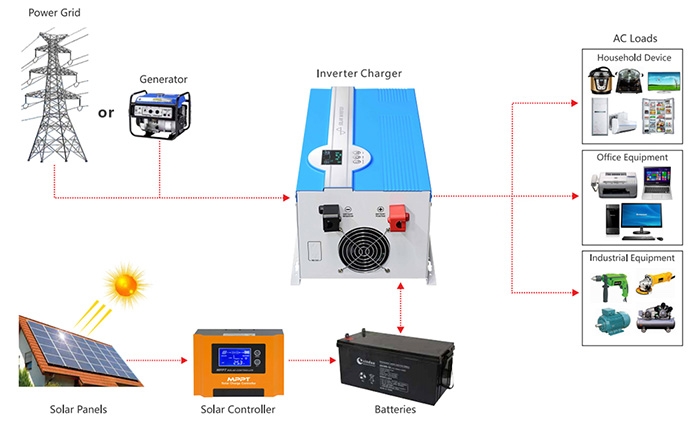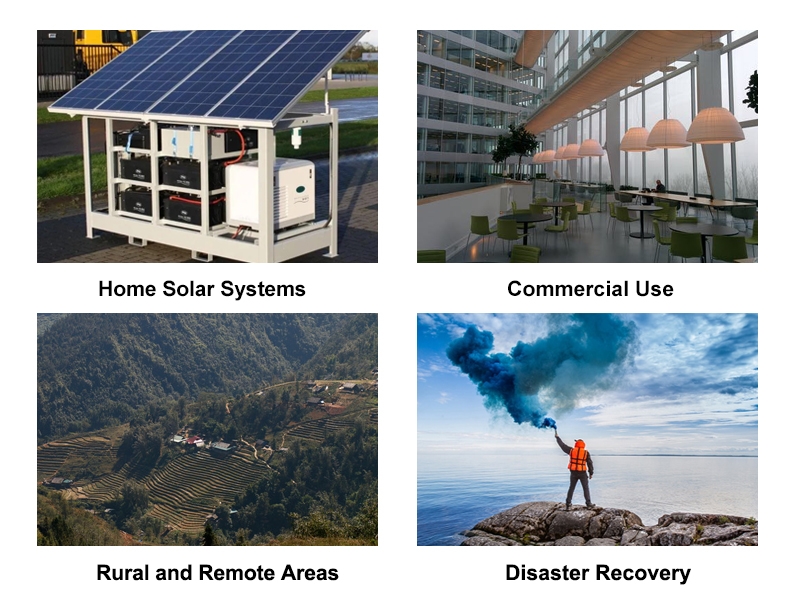Off-grid inverters are an important component in solar power systems and have many advantages that make them one of the key technologies in renewable energy systems. By using off-grid inverters, we can reduce our dependence on finite fossil fuel resources, lower carbon emissions, and increase energy independence, bringing positive impacts to both the environment and the economy. Off-grid inverters are not only beneficial to individuals and businesses but also have a positive impact on the global sustainable development goals.
Inverter Online Shop offers a wide selection of high-quality off-grid inverters in different models, such as 80kW pure sine wave off-grid solar inverter, 5000 Watt 48V off-grid solar inverter charger, and so on.
How does an off-grid inverter work?
An off-grid inverter is a device used to convert DC energy into AC energy, and off-grid inverters operate without the need to be connected to the public grid. Solar panels generate a DC through the photovoltaic effect. This DC is first fed into the off-grid inverter. The off-grid inverter converts the DC into AC and outputs it to the building's power grid.
In this way, the solar power system can power the building and also sell excess power back to the grid. In addition to converting solar power to AC, some off-grid inverters can also be used in conjunction with a battery system. This means that excess solar power can be stored in the batteries in case it is needed. Off-grid inverters can manage the flow of electricity to ensure efficient charging and discharging.

What are the advantages of off-grid inverters?
- Independent Power Generation: Off-grid inverters enable buildings to generate power independently of the public grid. In emergencies, off-grid inverters can operate independently to provide a power supply, which is particularly useful for those in remote or unstable power supply areas, medical facilities, emergency services, and critical infrastructure. In addition, off-grid inverters can also be used in mobile homes, such as campervans or boats, enabling them to be supplied with electricity without a grid connection.
- Energy Independence: Solar systems using off-grid inverters can increase energy independence. This means that a home or business can reduce its dependence on fossil fuels, thereby lowering energy costs and reducing carbon emissions. Off-grid inverters enable users to supply power independently of the main grid. This is particularly important for those living in remote areas or where the main grid is unstable. Off-grid inverters also provide backup power for emergencies.
- Environmentally Friendly: Off-grid inverters are used in conjunction with solar panels, which are a clean source of energy. Off-grid inverters do not produce noise or emit pollutants, which allows them off-grid inverters to be widely used in urban and sensitive environments as well, helping to improve the quality of the environment. Therefore, off-grid inverters help reduce the demand for fossil fuels, lower greenhouse gas emissions, and help address climate change issues.
- Renewable Energy Storage: Some off-grid inverters have an energy storage feature that allows them to store excess solar power in a battery. This allows solar systems to continue to supply power at night or on cloudy days, increasing the availability of renewable energy. Off-grid inverters work perfectly with solar photovoltaic and wind power systems to convert renewable energy into usable electricity. This helps to reduce dependence on fossil fuels, reduces greenhouse gas emissions, and contributes to environmental protection.
- Saving on Electricity Bills: Off-grid inverters allow building owners to generate their electricity. Off-grid inverters allow for efficient energy conversion and minimize energy waste. Off-grid inverters often feature sleep mode and automatic shutdown to further reduce energy consumption. Off-grid inverters are typically designed for long-lasting use and are highly reliable. Off-grid inverters are precision-engineered and tested to ensure stable operation under various environmental conditions. As a result, people can reduce or even eliminate expenses associated with electricity bills from the public grid. In addition, some regions offer government incentive programs to reward homes and businesses for using solar energy systems.
- Long-term Return on Investment: Although solar systems are expensive to install, off-grid inverters help to realize a long-term return on investment. Solar panels and off-grid inverters typically have a long lifespan and excellent energy performance, and these systems can provide inexpensive electricity to buildings for many years, thus recouping their costs and creating long-term savings. Off-grid inverter systems can be easily scaled to accommodate the growing electricity demand, making them ideal for future sustainable energy solutions, so off-grid inverters can deliver a good return on investment over the long term.
- Increase Property Value: Properties with solar systems and off-grid inverters are often more attractive than those without them, as off-grid inverters can reduce energy costs for future occupants. Off-grid inverters have a wide range of output voltage and frequency settings to meet a variety of power needs, including domestic, agricultural, commercial, and industrial applications. Off-grid inverters typically have lower maintenance costs compared to conventional power generation systems. They have no mechanical moving parts and therefore require less maintenance, which reduces operating costs. This can increase the value of the property and make it more competitive in the marketplace.
What are the application areas of off-grid inverters?
Home Solar Systems: In a home solar system, an off-grid inverter allows the homeowner to use solar electricity for power, hot water heating, heating, and other purposes, including powering a solar water pump. Such a system can significantly reduce electricity bills and provide renewable energy for the home.
Commercial Use: Off-grid inverters are also widely used in commercial environments such as office buildings, factories, and stores. Systems with off-grid inverters can help businesses reduce their energy costs, reduce their dependence on the grid, and demonstrate their commitment to sustainability.
Rural and Remote Areas: In remote and rural areas, the availability of the public grid is often limited. Off-grid inverters enable residents in these areas to utilize solar energy to meet their power needs and improve their quality of life.
Disaster Recovery: Off-grid inverters are also very useful in emergencies following natural disasters. Off-grid inverters can supply electricity to help people light up, recharge, and maintain communications while waiting for the grid to return to normal operation.
Off-grid inverters are an integral component of a solar power system. The advantages of off-grid inverters include independent power generation, energy independence, environmental friendliness, renewable energy storage, savings on electricity bills, long-term return on investment, and increased property value. These advantages make off-grid inverters one of the key technologies driving the renewable energy revolution. In the future, off-grid inverters will continue to evolve to improve efficiency, intelligence, storage system integration, and multi-energy system integration to further promote the sustainable use of renewable energy.
